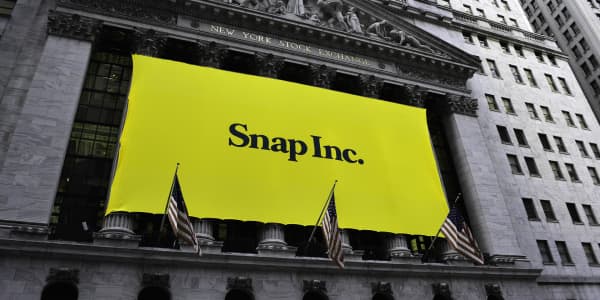Snap's co-founder and CEO Evan Spiegel blamed the poor performance of its app on low end Android phones as the reason why the company's user growth slowed in recent quarters at its IPO roadshow luncheon Tuesday.
The meeting held at Mandarin Oriental hotel in New York City lasted nearly 50 minutes and consisted of a question and answer session with senior members of the company's management team, according to multiple Wall Street investor attendees.
Snapchat's daily active user year over year growth decelerated from 65 percent in June 2016 quarter to 62 percent and 48 percent in the September and December quarters respectively, according to the company's S-1 filing.
When asked by about Snapchat's slowing user growth the last few quarters, according to an investor who attended the luncheon, Spiegel said:
"I think broadly speaking if you look at rest of world growth as a proxy for Android, you can start getting an understanding for the performance issues we face on Android in the last two quarters … [Snapchat] Memories worked very very poorly on low-end devices, largely because of the way we were caching images. The best way to get an actual feel for that is to buy a $100 Android on Amazon and play with the app. That will give you a more qualitative understanding of the issues we face on lower end devices. We've been investing a lot in fixing that and we actually changed the way we develop our products. So in the past our design teams used only iPhones … Now we transitioned half the design team to Android."
When contacted for this story, Mark Cuban elaborated on Spiegel's answer in a direct message: "Makes perfect sense. It's an image driven app that can overwhelm lower end devices. But that's fixable."
Another hedge fund investor, who attended the event and requested anonymity due to private nature of the meeting, agreed.
"It's a fair excuse because low end Android development is known and well covered problem given fragmentation and given those devices are less engineered for high quality video," the person said.
"It does not matter to the business right now however, as even if they had the issues fixed today, the monetization would be small. Facebook for example has a U.S. ARPU [average revenue per user] of $19.81 and $2.07 in Asia, and $1.41 in ROW - and that is a mix of Android and Apple users. As we know for the app store statistics, Apple monetizes at 1.6x Android, so the Apple users they do have in those developing markets are worth more to advertisers than the low-end Android users," the investor added.
One top Wall Street internet analyst mentioned competition from Facebook's Instagram Stories feature, which launched in Aug. 2016, may be a factor in the slower growth metrics.
"I think it makes sense to some extent, i.e. the photo and video-centric nature of the app may make it less appealing to users on slower connections or lower-end phones. I wouldn't dismiss the potential impact that Instagram's updates have made, however. The story will be monetization, in terms of the North America and Europe user base, and how quickly advertising revenue ramps to reach the Snapchat demographic," Baird's Colin Sebastian wrote in an email.





